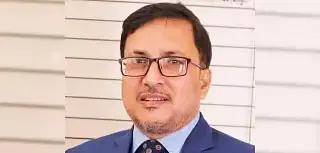
“People should not hold the government responsible alone for the corruption of the health sector. We all are part of it.” The faces of this “all” sprang up in the mind’s eye after hearing the speech the of newly appointed director general (DG) of the Directorate General of Health Services (DGHS) professor Abul Bashar Mohammad Khurshid Alam. Does that “all” include those hapless people who died miserably, without getting any treatment, physicians who died for the lack of ICU services? Is that physician who sat dejected on the road as he could not save a patient, who did not get admission at a hospital, a part of this mismanagement? Did the new DG hold all of them responsible for the miserable condition of the health sector?
Also Read
‘Govt not solely responsible for health sector corruption’
How would he equally divide the fault of Regent Hospital’s Shahed, JKG Health Care’s Sabrina and fake mask supplier Turna among all 170 million people of Bangladesh? Are the people who looking for an oxygen cylinder to treat their parents or children similar to those who have led us to this dire situation? Did he try to say, you are suffering so miserably because all of these are the consequences of your actions, because all are equally responsible of the corruption! The authorities are not responsible at all.
This is called victim blaming. This means, the victim of a crime or any wrongful act is held entirely or partially at fault for the harm that befell them. From the colonial rulers to the autocrats, every one is an expert in this
Nowadays, anyone outside of the government is ‘general people’. If there was any opposition, they could have been held responsible. If he wanted, he could have blamed the BNP (Bangladesh Nationalist Party) for everything like an incumbent minister. But he did not. Instead, he blamed ‘all’ and that includes you and me.
We truly have entered an era where a tree is known by the words it says instead of the fruits it bears. The new DG to the health directorate, professor Abul Bashar Mohammad Khurshid Alam, has introduced himself with words. He has replaced previous DG who was forced to resign because of corruption allegations.
Also Read
Health ministry, DGHS clashes bring work to a near halt
At a point of time when people are furious with corruption, with the irresponsibility and cruelty of the health minister, secretary and DGHS officials amid the coronavirus outbreak, the new DG’s remarks simply adds insult to injury. He was supposed to work to bring back people’s trust in the health sector, warn his administration for the past corruption. Instead he shifted the blame to the people. In another words, he clearly gave the go-ahead to the corrupted people of the health sector to continue their misdeeds like ‘good old days’. He clarified, persons change, not the system. Blaming a victim of corruption for the crime is a moral offence. The new health DG has committed that offence.
capital, Mizanur Rahman, organised a symbolic protest and asked the WASA DG to drink supply water from his tap, the WASA DG termed Mizanur Rahman a ‘mad’ person. That was also victim blaming.
Also Read
Health sector in dire straits due to inefficiency, mismanagement, corruption
Yes, people of the country are likely to have a tendency to corruption if the authorities of the state and administration are corrupted. In this situation, corruption is the valid currency. People are forced to bribe when they have no other way to get service from the state. Who is to be blamed, then, people or those who keep the system working?
When Bangladesh topped the index of most corrupted countries for three times in a row, no one blamed the people. The government was blamed. The nature of the corruption of the statecraft and the government is to ensure well-being of a few people depriving the rest. That is why everyone does not get the chance to commit corruption and enjoy its fruit. In reality, this is impossible. Only rights and services could be given to all. If everyone gets the chance to do corruption, then that is not corruption at all. That is why only a few powerful people can commit corruption. If those powerful people, to save them, blame the victims for the corruption, then we can be sure that calling a thief a thief is no longer task in this country.
* Faruk Wasif is a poet and an assistant editor at Prothom Alo. He can be contacted at faruk.wasif@prothomalo.com
* This article has been rewritten in English by Shameem Reza









